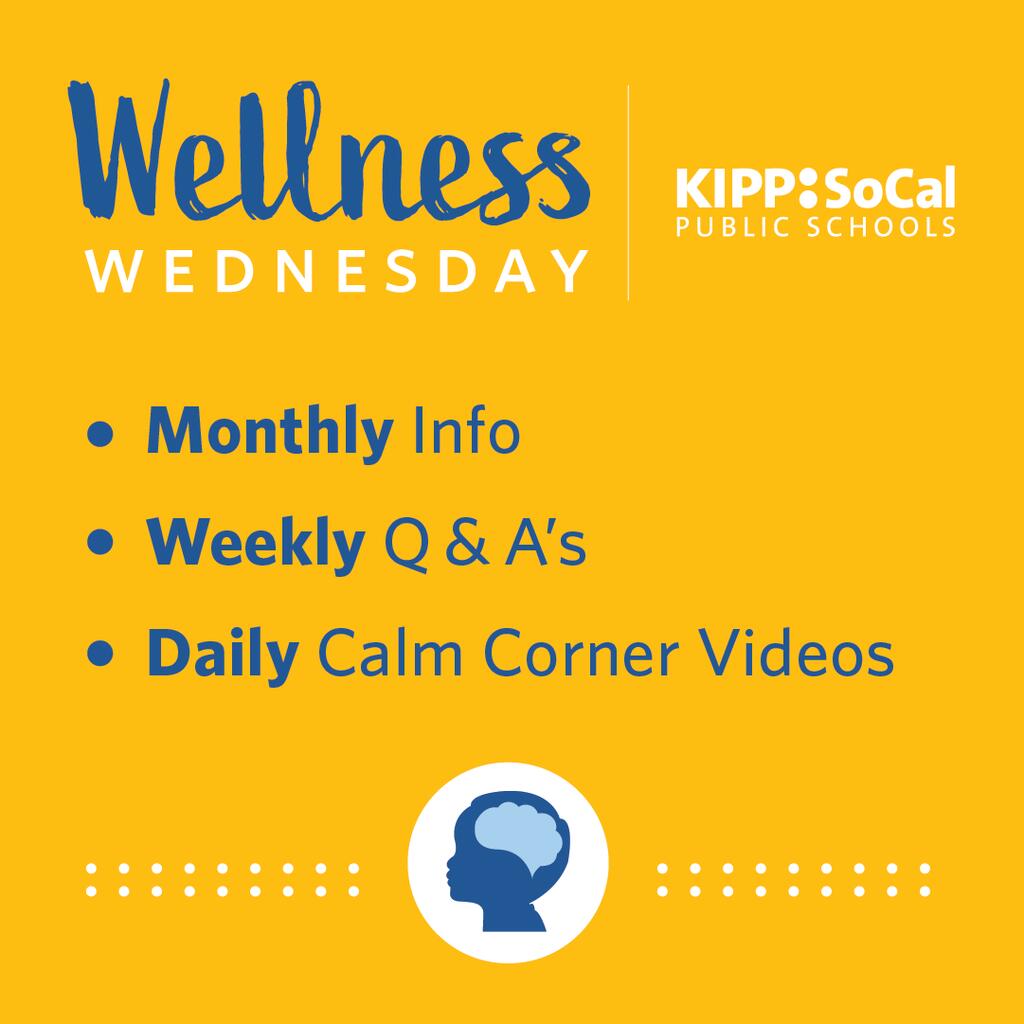
#WellnessWednesday
Did you know that 1 out of 5 people in this country have a mental illness?1 Mental illness affects people across cultural, racial, ethnic and socioeconomic lines, but 5 out of 5 people have mental health — we all have mental health!
May is Mental Health & Trauma Awareness Month, which means that it is an important time of year to raise awareness — acknowledge that mental health is just as important as physical health, reduce stigma around mental illness, understand that mental illness doesn’t look the same way for everyone, emphasize that counseling and therapy are available, and remind people that there is nothing wrong with getting help.
In this "Healing The H.E.A.R.T. So The Brain Can Learn" #WellnessWednesday bilingual community information session — hosted by Jasmine Lamitte, Director of Mental Health & Support Services, and Dr. Stephanie Nuñez, Mental Health Program Manager — parents/guardians learned what trauma is and found out more about our H.E.A.R.T. initiative to help support both children and parents/caregivers.
A reality for many, especially in light of COVID-19, is the exposure to stressful or traumatic events. But, what is trauma? "Trauma is any experience that leaves a person feeling hopeless, helpless, fearing for their life/survival or their safety that lasts beyond 4-6 weeks. The experience can be real or perceived." According to the National Alliance on Mental Illness, “mental health conditions can also begin to develop in young children.” The most obvious symptoms are behavioral, since at a young age they’re still learning how to identify and talk about their thoughts and emotions.
Thus, symptoms to lookout for in children may include:
- Changes in school performance
- Excessive worry or anxiety (i.e. fighting to avoid bed or school)
- Frequent nightmares
- Frequent disobedience or aggression
- Frequent temper tantrums
- Hyperactive behavior
H.E.A.R.T.
“You are not alone.” At KIPP SoCal we understand the impact that mental health and trauma can have on learning and behavior which is why our public schools are trauma-informed and focused on building resilience through our Healing Environments And Responses to Trauma (H.E.A.R.T.) initiative.

“Our H.E.A.R.T. approach teaches educators to understand the impact that stress and trauma can have on a child's ability to regulate their emotions, behavior, and ultimately learn. We heal the heart so the brain can learn,” said Jasmine Lamitte, KIPP SoCal’s Director of Mental Health & Support Services.
Mental health support can be found at each KIPP SoCal school, which includes a broad range of services, settings, and strategies from our Mental Health & Support Services team of licensed and certified school counselors, social workers, psychologists, and behaviorists.
Our multidisciplinary team helps in the following ways, but not limited to:
- Individual and group counseling services to support social and emotional learning
- Guidance and consultation to school teams on effective academic and behavioral interventions
- Robust internal special education services
- A continuum of mental health support
- Additional specialized student support services to respond to the needs of every student and their families, so they can thrive in school and beyond!
Calm Classroom
"In our years of implementing our H.E.A.R.T. program we've seen students learn mindfulness techniques through our Calm Classroom curriculum to help them navigate the stress of grief and loss or divorce," stated Lamitte. "We've seen students who have experienced trauma feel safe." To continue these practices even through COVID-19, our team has brought a Virtual Calm Corner designed to assist in identifying strategies for managing emotions and promote resilience and wellness. Try this activity (or more if you like)!
“The mental health of our caregivers and parents is important too,” stressed Lamitte. “We are partnered with several community mental health agencies to ensure that our families have access to the mental health services they need to deal with life's stresses and traumas.”
Wellness Wednesdays
“We have also launched our bimonthly Wellness Wednesday Webinars via Facebook Live to empower parents and caregivers with information on children and adolescent mental health and wellness, plus the best ways to support KIPPsters during Hybrid Learning,” shared Lamitte.
Now more than ever we need to prioritize deep conversations about mental health. It is of utmost importance that our community stays together and shows that no one is ever really alone, because we have each other!
Where to Get Help
 Our counseling team is the backbone of our H.E.A.R.T. initiative and collaborate with families to get them and their students the mental health and basic needs that they need from referrals to community mental health agencies, connections to resources that provide food, and legal and financial assistance.
Our counseling team is the backbone of our H.E.A.R.T. initiative and collaborate with families to get them and their students the mental health and basic needs that they need from referrals to community mental health agencies, connections to resources that provide food, and legal and financial assistance.
Please know that if you believe you or someone you know is living with undiagnosed mental illness, you’re not alone — don’t be afraid to reach out to your School Counselor for help or email our Mental Health & Support Services team at wellness@kippsocal.org! “Learning all you can about mental health is an important first step.”2
Join us on Facebook Live @kippsocal next month as our Mental Health & Support Services team lead our #WellnessWednesday sessions.
About Jasmine Lamitte:
.png?mask=256) Jasmine Lamitte, Director of Mental Health & Support Services, is a Licensed Clinical Social Worker. Lamitte is a native of Southern California and received her B.A. in Psychology and Africana Studies from Pomona College and a Master's in social service administration from the University of Chicago. Prior to joining KIPP SoCal team and family, Jasmine spent 4 years on Chicago's South Side in both Chicago Public Schools and Charter Schools.
Jasmine Lamitte, Director of Mental Health & Support Services, is a Licensed Clinical Social Worker. Lamitte is a native of Southern California and received her B.A. in Psychology and Africana Studies from Pomona College and a Master's in social service administration from the University of Chicago. Prior to joining KIPP SoCal team and family, Jasmine spent 4 years on Chicago's South Side in both Chicago Public Schools and Charter Schools.
Find out Your ACE Score: KIPP SoCal ACE Questionnaire (English & Spanish)
For additional resources on mental health, visit:
- Hathaway-Sycamores Child and Family Services to contact them for new referrals email referral@hscfs.org or call 1(844) 222-2377.
- Kedren Community Mental Health 1(323) 233-0425
- National Alliance on Mental Illness contact the NAMI HelpLine at 800-950-NAMI to find out what services and supports are available in your community, or in a crisis text "NAMI" to 741741.
- Penny Lane
-
Violence Intervention Program email contact@vip-cmhc.org or call 1(323) 221-4134
If you notice a drastic change in your child's mood, don't hesitate to reach out to their healthcare provider.
1 National Alliance on Mental Illness. Retrieved from www.nami.org.
2 National Alliance on Mental Illness. Retrieved from www.nami.org.
